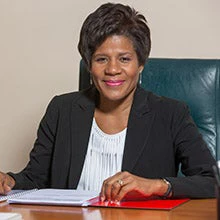 Marie-Francoise Marie Nelly, the new Country Director for South Africa, meets with young people during her visit to the Kago Community Hub in Tembisa Township.
Marie-Francoise Marie Nelly, the new Country Director for South Africa, meets with young people during her visit to the Kago Community Hub in Tembisa Township.
Only three weeks after my arrival in South Africa, the country that is to be my home for the next three years, my team and I are in Tembisa, a township east of Johannesburg. Tembisa, where nearly half of the 460,000 residents are between 18 and 35, is one of the many townships that are a jarring reminder of the disjointed patterns of apartheid, which marginalized communities were isolated in areas close enough to provide cheap labor yet far enough to ensure clear social distance. While the delivery of services has improved since the dawn of democracy in 1994, most townships remain places with high levels of unemployment and few opportunities for careers or skills training.
The first stop on our visit was the Youth Employment Service (YES) Kago Community Hub, a group of shipping containers clustered together to provide a versatile and vibrant training center for unemployed and disadvantaged youth. The training they receive—in coding, basic finance, and other technical and social skills—will help them quality for year-long work placements with South African firms.
The most striking discovery is that the youth we met at the Hub all said they want to become entrepreneurs. Moreover, these young people see entrepreneurship as a way to help their community, and who is better placed to solve local problems than the very people who live there?
One of the containers, for example, is set up as a factory run by 15 young women. Clad in white coats, gloves, and paper hair nets, they manufacture compostable sanitary towels and sell them at an affordable price to the community. In South Africa, where around 2.8 million girls and women have no access to such products, these entrepreneurs are providing an essential service. One of the women, Zodwa Makgetha, 26, said this job—her first— has given her a chance to support her two-year-old son and other members of her family.
In another part of the Hub, we met Winnie Mbasana, 28, an energetic young woman who connects her peers to the job market and tertiary education at the internet café she co-owns. With WiFi, albeit slow, she proudly provides a much needed service to her community; in Tembisa, more than 50% of the people have no internet access, and those who come to her café, many of them school dropouts, often have low computer skills.
At the Masupatsela Women’s Cooperative, a recycling facility, I talked with I talked with Salphy Mokoena, an inspiring woman who has built a sustainable business out of what many in the township considered a dirty job. Salphy and her partners found a way to generate income out of waste, allowing them to feed, educate and build homes for their children. The cooperative has grown from very humble beginnings into a sophisticated waste collection business that employs several staff and buys waste from households and small recyclers in Tembisa. Salphy is quite modest in her aspirations, saying she would like to increase her impact beyond the 600 households that are now separating their waste for recycling, and hopes to employ even more disadvantaged members of the community.
We rounded off the trip with a visit to one of Johannesburg’s most successful enterprises in the food and entertainment industry, Imbizo Shisanyama in the nearby township of Ivory Park. After a long day in the South African summer sun, Imbizo was the perfect oasis for us to reflect on the day’s events and what can be done to harness the amazing energy bubbling in the township. To help us digest the day’s experience is Bulelani Balabala, the young entrepreneur behind one of the country’s largest entrepreneurship ecosystems, the Township Entrepreneurship Alliance, or TEA as the platform is affectionately known. TEA is a network for township businesses to assist them with knowledge, skills and enterprise development and access to markets. Bulelani had us all captivated by his account of daily challenges that small businesses experience, but we were even more drawn to the opportunities he envisions for entrepreneurship in the township.
I left Tembisa and Ivory Park with mixed feelings. I know that there are challenges throughout the country, where the youth account for almost two-thirds of the nearly seven million unemployed people in the country.
But I believe strongly that Tembisa and other townships are perfectly poised as the country’s convergence engine. The concentration of a largely young population and their burgeoning economic activities, combined with the right suite of interventions, has the potential to rapidly transform the townships. What is most apparent is that the combined efforts of the multitude of role players, is greater than the sum of these differentiated parts. We need to build ecosystems with the communities of practice, the people within townships together with organizations both large and small, eager to make a difference in our communities.
This has been a first striking learning experience for me, and I am committed to visiting a new township each month to better understand the potential of this country. More importantly, I want to use my tenure as Country Director to help scale up such initiatives, which not only create hope for the youth, but also harnesses their entrepreneurial potential for positive change. It only needs to be nurtured with the appropriate incentives.


Join the Conversation